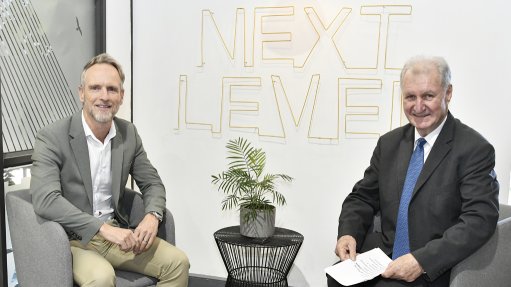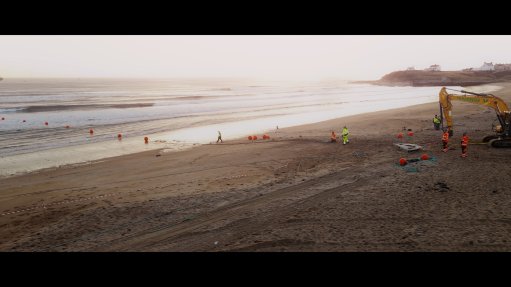CBE to hold a two day climate change Indaba
This article has been supplied.
The Council for the Built Environment (CBE) is well on track to convene its second Built Environment Climate Change Indaba (BECCI) in Mandeni Local Municipality in KwaZulu-Natal on 07-08 November 2024. The Indaba will be held under the theme” Co-creation of spaces and places that respond to just transition".
The BECCI is a direct response to these pressing climate challenges. Its focus is to bring together stakeholders from the Engineering and the Built Environment sector, Disaster Management and the South African Weather Service (SAWS) to co-create sustainable, resilient, and equitable spaces that address climate change and socio-economic disparities.
The Indaba is particularly critical in the context of the CBE’s mandate to transform the Built Environment, promote sustainable development, and contribute to inclusive socio-economic growth. The theme of "Co-creation of spaces and places that respond to just transition" reflects the need for a collaborative and inclusive approach to climate resilience. It aligns with the country's broader goals of addressing climate change while ensuring social equity, economic opportunity, and environmental sustainability in the Built Environment sector.
The CBE’s 2024 BECCI is centred around building a climate-resilient Built Environment for South Africa while acknowledging and incorporating the Indigenous Knowledge Systems (IKS) in the entire construction lifecycle, and processes and legislations of national, provincial and local government.
Until now, severe flooding and mudslides in KwaZulu-Natal, particularly affecting Durban and surrounding areas, have impacted thousands of people in the region which was declared a state of disaster by President Cyril Ramaphosa.
The South African Weather Service issued escalating warnings, ultimately reaching Level 9 due to the severity of the conditions. More than 440 people died, with some still missing. These natural disasters are worsened by poor drainage and building standards, especially in low-income areas. There was significant damage to over 13,000 homes, disrupted water supply, impassable roads, and destroyed bridges. Additionally, the recent snowfall in KwaZulu-Natal, which tragically claimed two lives, underscores the growing severity and unpredictability of South Africa's weather patterns. The snow and icy conditions led to the closure of the N3 highway between Gauteng and KZN, stranding numerous travellers, which highlights the vulnerabilities in our infrastructure amid extreme climate events, necessitating urgent policy and planning responses.
Mandeni Local Municipality, located on the North Coast of KwaZulu-Natal, is one such area which faces significant challenges due to recent climate disasters, particularly floods, that have disproportionately impacted its vulnerable communities. These disasters have exposed the fragility of the Built Environment, leaving homes, infrastructure, and livelihoods in disrepair. Vulnerable groups, such as low-income families and rural communities, often bear the brunt of these climate shocks due to inadequate housing, poor infrastructure, and limited access to resources.
Mandeni is a hive of community projects aimed at improving the livelihood of the people of Mandeni Local Municipality. Currently there are numerous active projects, all emanating from community engagements with the Integrated Development Plan(IDP) and Budget Roadshows. These projects are aimed at eradicating slums and informal settlements, creating strong community facilities, able to deal with climate changes particularly in high-risk areas, and emanate from engagements with Izinduna, AmaKhosi and community members amongst others.
Projects that are currently been implemented include the Inyoni housing project, offering a multiple housing typology including the first ever public rental housing units. The project’s total yield is 3020 inclusive of BNG housing, serviced sites, community residential units as well as non-residential sites extending opportunities for social and economic opportunities. Other similar projects are Isithebe rural housing project set to yield 2000 units across wards 11,12,16,17 and 18, Macambini rural housing project set to yield 2000 units across wards 1,2,8 and 9. Planning activities are underway for Isikhonyane rural housing phase 2. Further, the municipality is also active in promoting secure home ownership through the implementation of the title deeds restoration programme through various projects including Hlomendlini, Sundumbili and Inyoni title deeds projects which have unlocked the transfer of over a 1000 individual title deeds to residents.
The BECCI will bring together stakeholders from the engineering and the Built Environment sector under one roof to discuss and enhance climate resilience in South Africa’s Built Environment by fostering collaboration to generate new knowledge and insight geared towards reducing and mitigating the impact of climate change in the sector. The objective of the Indaba is to:
Provide a platform for collaboration and sharing of knowledge among communities, industry, academia and the public and private sectors
Interrogate challenges and generate possible recommendations and/or solutions from multi-dimensional perspectives
Track the overall progress of measures and interventions aimed at reducing and mitigating the impact of climate change in the South African Built Environment year-on-year
Provide a progress report on the actions identified in the previous BECC Indaba
The outcomes and resolutions from the BECCI 2024 are expected to feed into the operations and functions of the CBE’s and its stakeholders on numerous levels. Furthermore, the BECCI will aim at addressing climate change related challenges facing the South African Built Environment and vulnerable communities at large. The expected outcomes are to:
Contribute to the COP 29 Agenda, Presidential Climate Commission and Sustainability Goals through the Built Environment Industry’s Implementation of climate resilience and adaptation.
Establish a collaborative platform for knowledge sharing among communities, industry, academia, and both public and private sector
Examine challenges and propose recommendations/solutions from various perspectives
Monitor the annual progress of measures and interventions aimed at mitigating climate change impacts in the South African Built Environment
Deliver a progress report on the actions identified during the 2023 BECC Indaba
The 2024 Built Environment Climate Change Indaba will be graced by the presence of several key stakeholders. Notably, the Minister and Deputy Minister of Public Works and Infrastructure, the Mayor of Mandeni Local Municipality, Mayors of iLembe District, Presidential Climate Change Commission, Presidents and Chairpersons of the Councils for the Built Environment Professions, leaders from the Cooperative Governance and traditional affairs portfolio, captains of industry including Managing Directors and Presidents of Voluntory Associations (such as Consulting Engineers South Africa, the South African Institute of Architects, the Association of South African Quantity Surveyors amongst others), and private firms and practices in the Built Environment. Additionally, leaders in key policy custodian Departments such as the Department of Public Works and Infrastructure, the Department of Human Settlements, the National Disaster Management Centre, South African Local Government Association, Department of Transport amongst others will participate in the dialogue.
Article Enquiry
Email Article
Save Article
Feedback
To advertise email advertising@creamermedia.co.za or click here
Comments
Press Office
Announcements
What's On
Subscribe to improve your user experience...
Option 1 (equivalent of R125 a month):
Receive a weekly copy of Creamer Media's Engineering News & Mining Weekly magazine
(print copy for those in South Africa and e-magazine for those outside of South Africa)
Receive daily email newsletters
Access to full search results
Access archive of magazine back copies
Access to Projects in Progress
Access to ONE Research Report of your choice in PDF format
Option 2 (equivalent of R375 a month):
All benefits from Option 1
PLUS
Access to Creamer Media's Research Channel Africa for ALL Research Reports, in PDF format, on various industrial and mining sectors
including Electricity; Water; Energy Transition; Hydrogen; Roads, Rail and Ports; Coal; Gold; Platinum; Battery Metals; etc.
Already a subscriber?
Forgotten your password?
Receive weekly copy of Creamer Media's Engineering News & Mining Weekly magazine (print copy for those in South Africa and e-magazine for those outside of South Africa)
➕
Recieve daily email newsletters
➕
Access to full search results
➕
Access archive of magazine back copies
➕
Access to Projects in Progress
➕
Access to ONE Research Report of your choice in PDF format
RESEARCH CHANNEL AFRICA
R4500 (equivalent of R375 a month)
SUBSCRIBEAll benefits from Option 1
➕
Access to Creamer Media's Research Channel Africa for ALL Research Reports on various industrial and mining sectors, in PDF format, including on:
Electricity
➕
Water
➕
Energy Transition
➕
Hydrogen
➕
Roads, Rail and Ports
➕
Coal
➕
Gold
➕
Platinum
➕
Battery Metals
➕
etc.
Receive all benefits from Option 1 or Option 2 delivered to numerous people at your company
➕
Multiple User names and Passwords for simultaneous log-ins
➕
Intranet integration access to all in your organisation


















